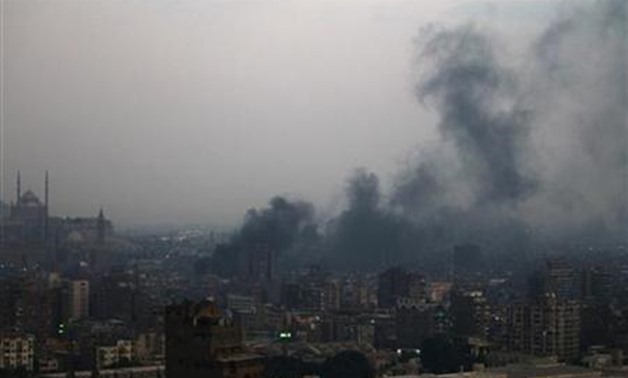
Smoke rises from burning garbage in downtown Cairo October 20, 2011. Environmentalists blame the burning of agricultural waste, mostly rice straw - Reuters
CAIRO – 30 December 2018: The recurring phenomenon of “Black Clouds” has always been a headache for the government, which has been fighting for years the practice of burning agricultural leftovers.
A cloud of thick smoke blankets the Delta each autumn, leaving the country with reportedly high levels of pollution and serious respiratory diseases. The Black Cloud is regarded as one of the main causes of climate change.
Burning excess rice straw is only one factor causing the thick smoke. It usually hangs over Egypt’s skies in October and November. Farmers burn leftover straw to clear the lands.
With the environmental and health issues resulting from the phenomenon, an action plan was set to encourage farmers to collect rice straw instead of burning it. In 2017, the former minister of environment introduced a new agro-waste system, turning waste into product; the system was initially implemented in Delta’s Sharqiah. A decline in the burning practice was noticed and reported in the governorate.
Despite having been lectured on the harmful outcomes of the practice, many farmers still burn tons of leftovers to clear their lands after harvesting the crop. Satellites were used to spot open burning processes, with penalties set to punish violators.
Each year, the government determines the number of feddans to be cultivated in rice to limit the process and rationalize water use.
The Ministry of Agriculture announced in August that the total area cultivated with rice amounts to 840,000 feddans (one feddan is equal to 1.038 acres).
Discussing progress
Over the past months, the Ministry of Environment has announced achievements regarding the waste management system, especially in dealing with excess rice straw.
In October, Minister of Environment Yasmine Fouad announced that the ministry will deliver 127 agricultural shredders to farmers to support the implementation of agricultural waste management system in the governorates of Beni Suef, Minya, Assiut, Sohag, Sharqiya, Qena, Luxor and Aswan.
Farmers were offered L.E. 50 ($2.82) for every ton of rice straw to encourage them to collect and hand over the straw to the government instead of burning it. It was announced that the amount of rice straw that was collected and pressed was 1.43 million tons, which is 91.2 percent of the produced straw The straw was collected by residents and agents hired by the ministry.
In the same context, around 504 straw gathering spots were located across the Delta governorates, resulting in the provision of 5,000 job opportunities.
In lines with the goals of turning the waste into product, the government has established a new model factory worth L.E. 50 million to recycle waste and leftovers in Adwa city, in Upper Egypt’s Minya governorate.


Comments
Leave a Comment